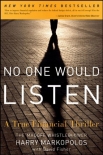No One Would Listen: A True Financial Thriller by Harry Markopolos (rainbow fish read aloud .txt) 📗

- Author: Harry Markopolos
Book online «No One Would Listen: A True Financial Thriller by Harry Markopolos (rainbow fish read aloud .txt) 📗». Author Harry Markopolos
It was logical and legal. A private citizen, a whistleblower, can share fees with anybody he or she wants to. They can give a piece to a law firm, which is the way most contingency law firms work, or they can also give a share to the team leader, which was me.
Gaytri Kachroo became my lawyer. She began negotiating with different firms, trying to find lawyers who would agree to those conditions. And eventually we found firms in several states. Those market-timing cases were Gaytri’s introduction to the SEC, and she got a good dose of its incompetence early in our relationship. When the SEC dropped all of my cases, I was livid. I was furious. I tend to be restrained; I like to be in emotional control, but this time my frustration was too much to hold inside. “These guys are good for nothing!” I screamed into the phone. “They’re never gonna get it. I can’t believe I keep giving them chances and they never get it!”
Because I had told Gaytri absolutely nothing about Madoff, she probably thought I was overreacting. But as she listened to me yelling about the SEC’s incompetence, about their stupidity, about their refusal to do their job, as she listened to me letting all my anger and frustration come out, she finally realized that I’d had previous encounters with that agency. And she began wondering about that.
Chapter 7
More Red Flags Than the Soviet Union
In August 2007 Frank Casey sent me an e-mail about a new financial product he’d found on the Internet site NakedShorts: “Investment dealers are excited to announce the newest structured finance product—Constant Obligation Leveraged Originated Structured Oscillating Money Bridged Asset Guarantees, or Colostomy Bags. Designed to accommodate the most sophisticated investment strategies, Colostomy Bags contain the equity tranches of Structured High Interest Taxable derivatives, or Shit, and are leveraged an infinite amount of times through the innovative use of derivatives.”
I probably smiled sadly as I read it, knowing that it was no less real than Madoff, and that if it actually existed and somebody could make money from it, they would sell it. I wrote back, “That’s an awesome-sounding product! Who do I call to get an allocation? I want to take down a small piece first, say $100 million, then pitch them to the French HFOF’s as a higher return, slightly higher volume product than Madoff.”
When Neil was sitting across the desk from me at Rampart and things got a little hairy, he would remind me that his mother, who never invested in anything more risky than a certificate of deposit, had tried to talk him out of going into the financial industry. “My Dad was in favor of it, telling me Wall Street people are smart. They make a lot of money. Get in the trenches and do a good job. But my Mom thought investment people were scam artists, and wanted me to become something respectable: ‘Be a doctor or a lawyer.”’
Then he would add, “And we aren’t even Jewish!” We’d laugh and manage to somehow get through the current crisis. But as the years went by, it occurred to me that maybe she knew what she was talking about. After spending so many years trying to convince government officials, reporters, and fund managers that Madoff was a fraud and being rejected or ignored by every one of them, it’s human nature to at least wonder if maybe everybody else was right and I was wrong. But the truth is that I never doubted myself. There is a single irrefutable fact that I relied on: Numbers can’t lie. That’s the basis of my career. First examine the numbers, then investigate how those numbers were generated.
The question I’ve struggled with, which all of us on the team have struggled with, is why did so many people permit this fraud to continue for so long? The industry knew, there’s no question about that. After Madoff collapsed, I was told so many stories about people who knew he was a fraud and warned others. For example, I’ve been told about an e-mail a manager at one of the largest investment houses sent to a Madoff client in 2005, warning him that “everybody here knows Madoff is a fraud” and urging him to get his funds out.
Another very smart guy Neil and I knew ran a fixed income arbitrage strategy for one of the major feeder funds that was heavily invested in Madoff. This manager joined the firm long after it had made its initial investments in Bernie, and I believe he eventually became a partner. This person is very outspoken, but he knows what he’s talking about. He speaks numbers. For example, when Rampart was marketing the product I’d created, he’d looked at it and figured out almost immediately that “This is a trade; it’s not a strategy.”
I explained to him that I was delivering a product that fulfilled certain demands, but he just crushed it. Neil and I wondered how somebody that smart could have gotten involved with this fund. He looked at my numbers and knew what I was doing, so he must have known what Madoff was doing.
Finally, Neil told him right to his face that Madoff was a fraud. When the man started to defend his fund’s investments, Neil challenged him: “Check the trade tickets. There are no trades.”
We have good reason to believe that he did exactly that, and that he discovered that the volume never happened at the prices Madoff quoted at the time Madoff said they did. It wouldn’t have been hard for him to do that;





Comments (0)